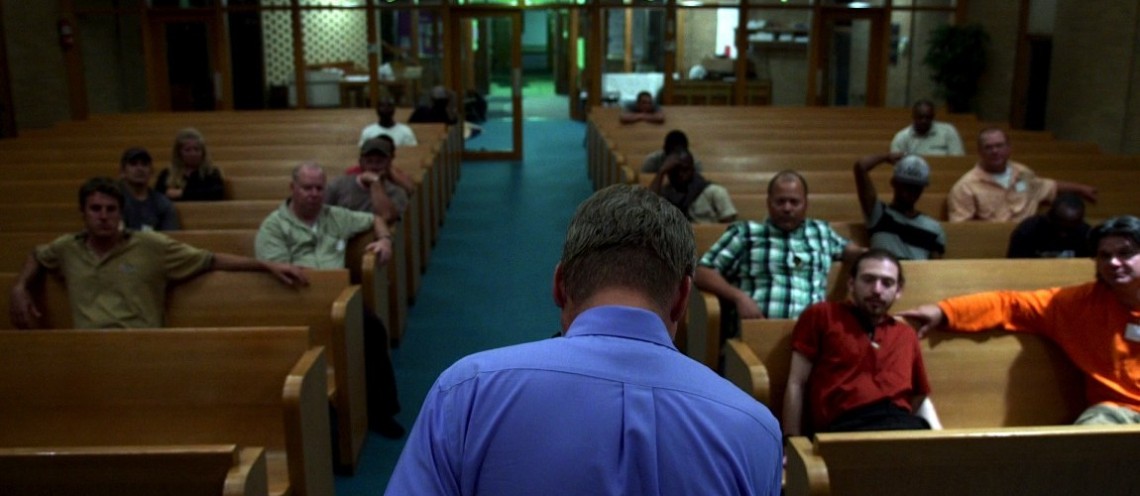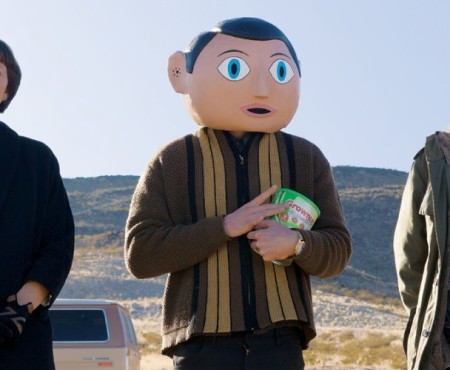“Love thy neighbor” is one of the foundational creeds of Christianity, which is, according to many, the set of beliefs by which Americans are supposed to live their lives. But America today is a land of rampant corporatism, a system in which love is not a tenet. The Overnighters is a documentary about compassion in conflict with the almighty dollar. Every problem faced by the characters is caused by our warped economic values, but no one ever suggests defying the system as a means of change. In its place, people trying to do good can only flail about almost helplessly.
The movie centers on one such do-gooder: Jay Reinke, the pastor of Concordia Lutheran Church in the small town of Williston, North Dakota. Thanks to the recent discovery of vast oil resources in the state, North Dakota is on the opposite economic track from most of the rest of the country, raking in billions from the black gold. Williston, located near an oil field, has become a boom town, and as a result has also become a magnet for out-of-state travelers desperate for work. But the influx is too much to handle, with far more people than can be comfortably housed in the tiny community. Crime has drastically increased and tensions are running high, as the locals try to figure out what to do with the foreigners, whom most of them view with distrust. Not Reinke, though. Where many Williston residents see criminals or parasites, he sees neighbors in need of love.
As director Jesse Moss and his crew joins him, Reinke is in the midst of running his “overnighter” program. He’s opened the doors of his church as a place for these men and women to sleep during their job hunts. Each night, it seems every inch of Concordia is packed with cots and sleeping bags, and there are even more people staying in their cars in the parking lot. Reinke set this up without the backing of his congregation, who are far less enthused than he is about the program. And the Williston community at large is about to pass a law against long-term living in trailers or RVs, which would be a devastating blow to the overnighters. Reinke spends much of the movie pleading with his townspeople to indulge some empathy, but he’s often beseeching deaf ears. People just want to go back to the way things were.
The story of The Overnighters is a throughly American one. It tests and prods the idea that this is a land of opportunity. We tell tales about men traveling hundreds or thousands of miles to find work, to try to pull themselves up by their bootstraps. But when these men do it, they are smacked down by those who are better off. The oil profits are supposed to be enriching everyone, but Williston doesn’t look like it’s prospering. The only hint of wealth comes from a brief survey of one upscale neighborhood. The rest of the town is straining under the weight of its metastasizing population. The average folk have to fight for the scraps, because there sure aren’t enough scraps to go around. If an overnighter doesn’t find work in the oil fields within their first few days in town, they’re unlikely to get any work at all.
And at the center of all of this is Reinke, who is desperately trying to do the right thing, but fought at every turn by cowardice and what appears to be the true center of American values – “I’ve got mine, forget everyone else.” He keeps several overnighters in his own home, a service none of his parishioners emulate. When he goes door to door spreading the word about the impending law change, one man refers to the overnighters as “trash.” And in the capitalistic view, which reduces human beings to whatever functions they can perform, he’s right. But in the Christian view, these are the ones whom Jesus said need love the most. There are, it appears, few real Christians in Williston.
Or at least, that’s the vision constructed by Moss. And The Overnighters gives you at least some reason to interrogate its vision. There are parts of the doc where the seams are showing. In particular, one subplot about a registered sex offender withholds the nature of his crime for no other reason than to generate suspense, while the characters themselves are perfectly aware of what’s going on. It’s a very artificial move that detracts from the film’s overall feeling of naturalness. It doesn’t bother me nearly as much as it perhaps should, though. The movie’s thematic and character work is strong enough to make me forgive it, even if I can’t forget it.
Reinke and his journey, which takes some twists and turns you aren’t likely to see coming, grounds the wide-reaching themes in a heartbreakingly human element. The film doesn’t try to conceal his faults – his pragmatism is sometimes at odds with his sense of charity, and his apparently random whims lead more than one overnighter to turn against him. But the point isn’t that he’s the only good man in Williston or anything like that. It’s more that there are many good people there who are suppressing their instinct to do good. Shakespeare said that a good deed in a weary world is like a little candle that throws its light far. And T.H. White wrote about how trying to keep some spirit of basic human decency alive is like shielding a candle against the wind. That’s Reinke’s struggle.
And it isn’t enough. Under the pressure of the churchgoers, the overnighters program is shut down. One very late-stage revelation about Reinke’s conduct leads to his removal as a pastor. And so now there’s one less avenue of hope for people going a long way just to find work. It’s not that Reinke deserved to be treated infallibly, but it speaks to a crux of the issue: when you’re one of a few resources available, the expectations on you are higher than any human can possibly live up to. Call it a national infatuation with heroic ideals and individualism combined with its gutted institutions, or call it a way that capitalism divides and conquers those who try to impede it. In any case, the fall of Reinke and the overnighter program stems from the same cultural apathy and fear that drives us. The Overnighters is a wrenching, all-American tragedy.





















One thought on “LAFF Review: ‘The Overnighters’”
Pingback: The 2014 Cinematic Retrospectivus